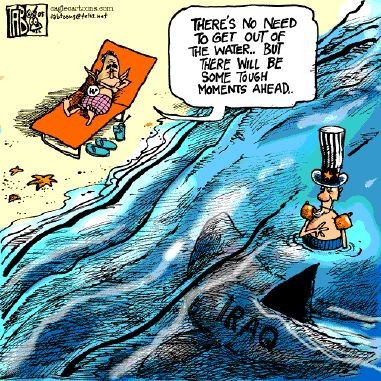Century Marks

Bush is no McKinley: Karl Rove, political advisor to President Bush, likes to compare Bush to William McKinley, who is often portrayed as probusiness. But according to Kevin Phillips’s new biography of the 25th president, the comparison isn’t fair to McKinley, who “embraced labor, favored spreading more of the tax burden onto the rich, not less, and . . . was so contemptuous of lobbyists and their practices” that he said “he would not have a lobbyist in his cabinet.” He also favored the establishment of a labor arbitration system, having personally mediated some disputes between labor and management when he was governor of Ohio. McKinley differed from Bush on foreign policy too; in 1898 he “held back rather than promote the rush to war with Spain.” McKinley, like Bush, was a Methodist (William McKinley, Times Books).
The Adams principle: Baby boomers who expect to continue working in their so-called retirement years might take John Quincy Adams as their model. At age 63 he started a career as a member of Congress after he had served as president. He did not view his new vocation as beneath him, nor did his constituents consider him overqualified. Although he was physically frail, he stayed on the job until his death at age 80, and he is remembered as having been a better congressman than president (New York Times, June 21).
Accentuate the positive: If the God you believe in hates all the same people you do, then you know you’ve created God in your own image, says Anne Lamott (beliefnet.com). Although her leftist politics puts her at odds with the Bush administration (“the most dangerous administration in the history of the republic”), Lamott works hard to not see the president as the enemy. Instead she puts her energy into doing what Jesus instructed his followers to do, “care for the weakest, the least of his people, which includes prisoners and the poorest of the poor and the oldest and most exhausted.”
Self-centered worship: In the past 30 years worship in American churches has shifted from an emphasis on an encounter with the divine to didactics, says worship consultant Sally Morgenthaler (Theology, News & Notes, Spring). The preferred form of worship in many congregations consists of a welcome, 20 minutes of singing contemporary music, then a special musical performance and a sermon. (In 1999, 38 percent of all churches used praise choruses; now 74 percent do.) Whatever else happens in contemporary worship is secondary to “disseminating information people need in order to gain more control over their lives” and to ensure that they achieve “individual happiness. (Never mind that control is an illusion and happiness is transitory. See Ecclesiastes.)”
Liturgical correctness: “Christ has died, Christ has risen, Christ will come again” is a familiar phrase in the Catholic mass, as well as in many Protestant liturgies. But a new translation of the mass from the Vatican expunges these lines because they do not speak of the congregation’s participation in the mass and are therefore “theologically insufficient.” The U.S. bishops, however, have voted to keep the traditional wording, arguing that dropping it would not be understood by the rank and file. Besides, said one layperson, there are so many other, more compelling issues facing the Catholic Church (RNS, June 17).
On fighting secularism: William D. Wood thinks it would be a mistake for the current pope to treat secularism as the new enemy of the church like the past pope treated communism, especially if in fighting secularism the church aims to reinstate Christendom. Moreover, it is simply wrong to equate secularism with relativism; not all secularists are relativists. “To address the spiritual problem of secularism, the church must deploy spiritual tools: it must present the gospel as surpassingly beautiful and worthy of love,” says Wood. “Sometimes, I think, the church even needs to get out of the way, and let the gospel present itself as surpassingly beautiful and worthy of love.” He concludes that “the church never needs to promote the gospel with the tools of the state,” which are “gross and coercive” (Commonweal, June 17).
Five influential Jewish men: Moses said the law is everything. Jesus said love is everything. Marx said capital is everything. Freud said sex is everything. Einstein said everything is relative (beliefnet.com).
Wish we had thought of that: After the Dalai Lama delivered a lecture, a member of the audience asked him what the answer to world hunger is. He responded, “Sharing” (quoted in Red Eye).
Correction: The May 17 issue identified contributor David Hoekema as academic dean at Calvin College. In fact, he no longer holds that post. He is instead a full-time professor of philosophy at the college.





